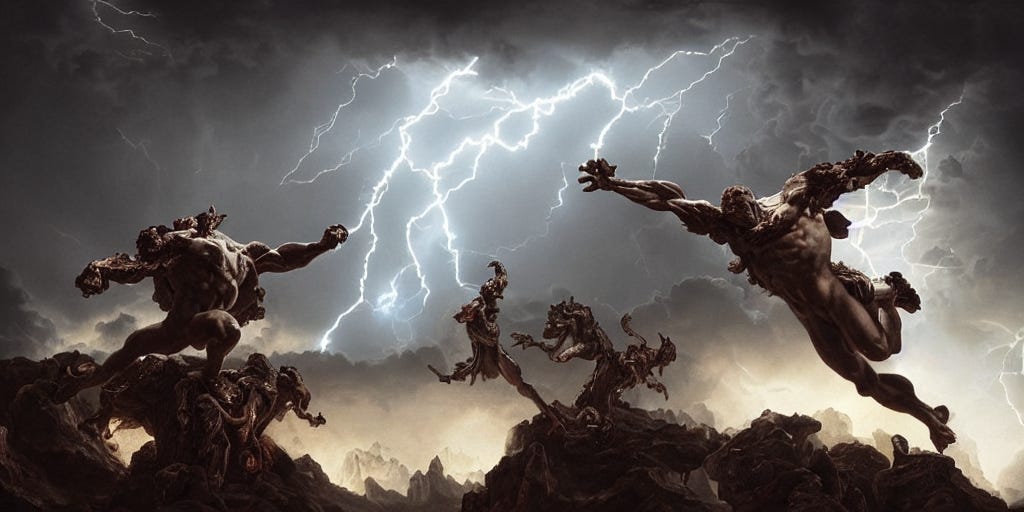Prometheus and GPT

🌈 Abstract
The article discusses the mythological story of Prometheus and draws parallels between his act of giving fire to humanity and the rise of social media and AI technology. It explores how the power of communication and connection, once controlled by gatekeepers, has now been democratized and how this has led to societal upheaval, much like Zeus's fear of Prometheus's gift to humans. The article also reflects on the author's role in the creation of the hashtag and how it became a cultural phenomenon, as well as the need to adapt and learn to work with emerging technologies like ChatGPT and GPT-4 in a way that augments our collective humanity.
🙋 Q&A
[01] The Prometheus Analogy
1. What is the key parallel drawn between Prometheus's gift of fire and the rise of social media and AI technology?
- The article draws a parallel between Prometheus's act of giving fire to humanity, which was seen as a threat by the gods, and the rise of social media and AI technology, which have also disrupted existing power structures and given more power to the people.
- Just as Prometheus defied Zeus and gave humans the knowledge of fire, the author and others helped democratize the power of communication and connection through social media, challenging the control of traditional gatekeepers.
- The article suggests that the emergence of AI technologies like ChatGPT and GPT-4 is a similar Promethean gift, empowering humanity in ways that may be seen as a threat by those in power, much like Zeus's fear of Prometheus's gift.
2. How does the article view the tension between withholding and unleashing new technological capabilities?
- The article suggests that there is a recurring tension between those who want to withhold new technological capabilities (like Zeus) and those who want to unleash them on humanity (like Prometheus).
- It argues that while new technologies can be disruptive and cause societal upheaval, they also have the potential to empower and enable people in profound ways.
- The article suggests that the path of progress requires both the adoption of new technologies and the development of robust mitigation strategies to address their negative effects.
[02] The Hashtag and Social Media
1. What was the author's role in the creation and spread of the hashtag?
- The author claims to have written the original proposal for the hashtag in 2007, suggesting it as a way to label content on social media to make it easier to find and participate in relevant conversations.
- The article describes how the author pitched the idea of using hashtags to a friend, Nate Ritter, who then started using them to report on wildfires in his community, helping the behavior catch on and spread.
- The author states that they were not an employee of Twitter, but as the 1,186th person to sign up, they were able to change Twitter and social media forever through the introduction of the hashtag.
2. How does the article view the author's role in the spread of the hashtag?
- The article suggests that the author's role in the creation and spread of the hashtag was not part of a grand plan, but rather a pragmatic and clever response to the needs of the emerging social media landscape.
- It describes how the author sought to find use cases that would prove the utility of the hashtag, and how the viral nature of its adoption, similar to viral dances on TikTok, helped it gain visibility and legitimacy.
- The article frames the author's actions as part of a broader cultural shift towards "acting now and begging forgiveness later" in the face of rapid technological change, where there was simply too much to learn and try to wait for permission.
[03] The Future of AI and Language
1. How does the article view the potential of emerging AI technologies like ChatGPT and GPT-4?
- The article suggests that just as Prometheus's gift of fire to humanity was a precursor to the demise of Zeus's power, the emergence of AI technologies like ChatGPT and GPT-4 represents a similar Promethean gift that has the potential to empower humanity in profound ways.
- It argues that these Large Language Models (LLMs) are essentially the sum total of our collective intelligence, and that by learning to work with them, we can further augment our collective humanity.
- The article encourages leaning in and towards these emerging technologies, rather than fearing them, as a way to learn and adapt, much like how humanity learned to master fire without a manual.
2. What role does the plasticity of language play in the article's perspective on the future of AI and technology?
- The article suggests that the plasticity of language, or our ability to communicate, connect, and co-create, is a tool much greater than fire that can help us make sense of the real world and the abstract world of ideas.
- It argues that our language is infinitely adaptable and moldable by mere mortals, and that this ability to communicate across generations, capabilities, and languages can help us better navigate the challenges posed by emerging technologies like AI.
- The article frames this as a key advantage that humanity possesses, and encourages using our collective cognitive abilities and the power of human language to learn, adapt, and ultimately augment our collective humanity in the face of technological change.